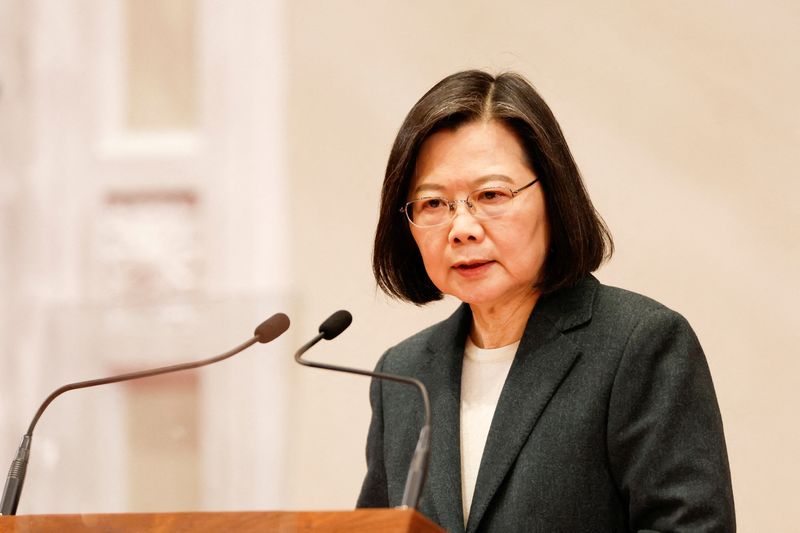BEIJING/TAIPEI (Reuters) -China said on Wednesday it was "seriously concerned" by Taiwan President Tsai Ing-wen's "transit" plans and had asked Washington for clarification, amid reports she will meet U.S. House Speaker Kevin McCarthy in the United States.
McCarthy plans to meet Tsai in the United States in coming weeks, two sources told Reuters on Monday. That could be instead of the Republican Speaker's anticipated but sensitive trip to the democratically governed island claimed by China.
McCarthy on Tuesday confirmed plans to meet Tsai in the United States this year and stressed this did not preclude a later visit to Taiwan, Bloomberg news agency reported.
Taiwanese presidents, including Tsai, have a record of travelling through the U.S. en route to other countries, usually for a day or two, though the U.S. government has generally avoided meeting senior Taiwanese officials in Washington.
Taiwan's presidential office, in a brief statement responding to what it said were media enquiries about Tsai's overseas visits, said "transit arrangements" had been in place for many years, though it did not directly mention the United States.
"At present, various departments are communicating and preparing for relevant plans, and the planning of the related itinerary will be explained in a timely manner after the plan is finalised," it added, without elaborating.
Speaking in Beijing, Chinese Foreign Ministry spokesperson Mao Ning said they were "seriously concerned about the news".
"We have lodged solemn representations with the U.S. side and asked them to clarify," she added.
China is firmly opposed to any form of official exchanges between the United States and Taiwan, she said, adding: "No one should underestimate the strong determination of the Chinese government and people to safeguard national sovereignty and territorial integrity."
"The real threat to peace and stability in the Taiwan Strait is the separatist forces of Taiwan independence," Mao said.
China has rebuffed calls for talks from Tsai since she took office in 2016, believing her to be a separatist.
China has never ruled out using force to bring Taiwan under its control. Taiwan's government says the People's Republic of China has never ruled the island and so has no right to claim it, and that only its 23 million people can decide their future.
Taiwan is a constant source of friction between Beijing and Washington. China's foreign minister said on Tuesday Taiwan was the "first red line" that must not be crossed in Sino-U.S. relations.

China staged military exercises around Taiwan in August following a visit to Taipei by then-U.S. House Speaker Nancy Pelosi.
The United States has no formal diplomatic relations with Taiwan but is bound by law to provide the island with the means to defend itself.